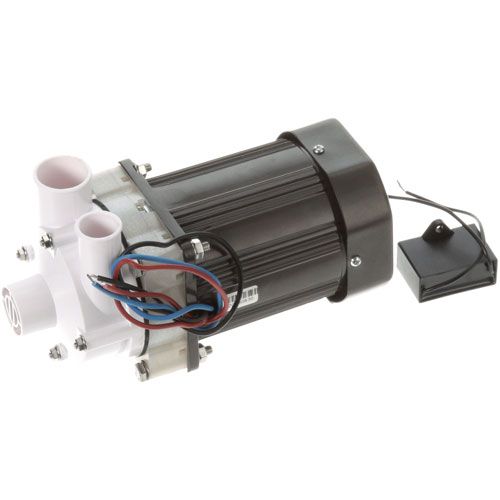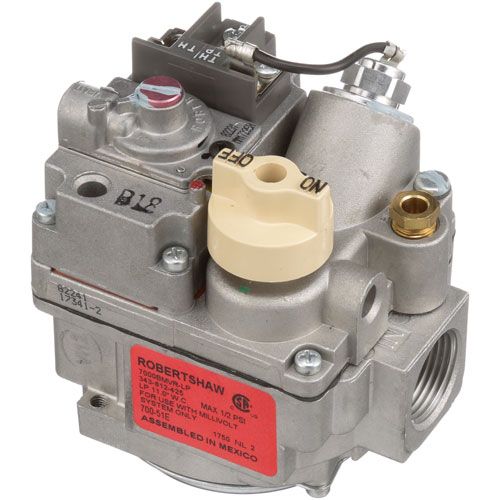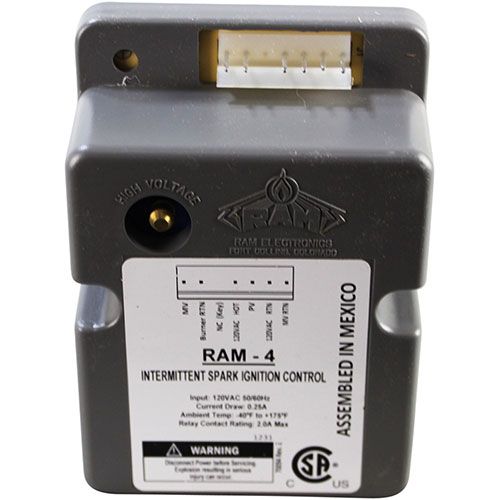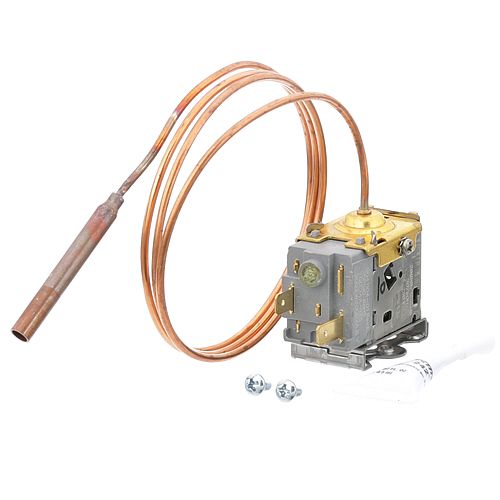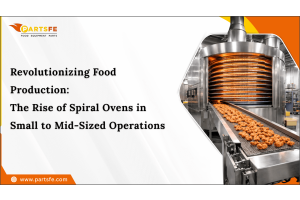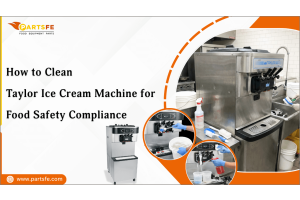The Future of Food Service: AI Advancements Reshaping Restaurants in 2024
Technology enhances restaurant operations by streamlining processes, improving efficiency, and enhancing customer experiences. Technology has revolutionized how restaurants operate, from streamlined ordering systems and inventory management software to personalized marketing solutions and online reservation platforms. One significant advancement shaping the restaurant industry is the growing role of artificial intelligence (AI). AI algorithms are increasingly being deployed to analyze data, predict consumer preferences, optimize menu offerings, and automate repetitive tasks. By leveraging AI in food and beverage industry, restaurants can enhance decision-making processes, personalize services, and unlock new opportunities for growth and innovation. The evolving landscape of technology, particularly AI, continues to redefine how artificial intelligence restaurants operate and interact with their customers, driving efficiency, innovation, and ultimately, success in the competitive food service industry.
| Table of contents: How is AI transforming restaurant management and operations? How can AI enhance the customer experience? What are the benefits of using robotic chefs and automated cooking systems? How is AI transforming order processing and delivery in the food industry? Improving food safety and quality control Targeted marketing campaigns using AI insights What are some AI solutions for minimizing food waste? Predictions for AI advancements in the food service industry |
How is AI transforming restaurant management and operations?
The integration of artificial intelligence (AI) in restaurant management has resulted in a paradigm shift, revolutionizing operations and enhancing overall efficiency. AI empowers restaurant managers to make data-driven decisions, optimize resource allocation, and deliver personalized experiences to customers. By leveraging AI-driven insights, restaurant management can adapt quickly to changing market demands, improve operational workflows, and achieve higher levels of customer satisfaction.
- Inventory management systems: AI in food manufacturing inventory management systems utilize predictive analytics to forecast demand, optimize stocking levels, and minimize wastage. These systems analyze historical sales data, current inventory levels, and external factors such as weather patterns or seasonal trends to ensure optimal inventory levels and reduce carrying costs.
- Supply chain optimization: AI tools are employed to streamline the supply chain by predicting procurement needs, identifying potential bottlenecks, and optimizing delivery schedules. By analyzing data from suppliers, transportation networks, and demand patterns, AI facilitates efficient supply chain management, reducing costs and ensuring timely and accurate deliveries.
Learn how these AI-driven advancements are revolutionizing the food industry and overcoming common challenges faced by restaurants.
Checkout: 13 Most Common Restaurant Challenges: Expert Tips & Solutions to discover practical insights and strategies to address these issues proactively.
How can AI enhance the customer experience?
Restaurants can provide dine with AI by analyzing customer data such as past orders, dietary preferences, and feedback. By leveraging this information, AI algorithms can recommend customized menu options, suggest personalized promotions, and tailor dining experiences to individual preferences, ultimately enhancing customer satisfaction and loyalty.
- Use of chatbots and virtual assistants for reservations and customer service: Chatbots and virtual assistants powered by AI are revolutionizing the way restaurants interact with customers. These tools facilitate seamless reservation processes, handle customer inquiries, and provide real-time assistance, enhancing operational efficiency and creating positive customer interactions. By utilizing AI-driven chatbots, restaurants can offer 24/7 support, streamline reservation management, and promptly address customer queries, resulting in improved service quality and customer satisfaction.
- Food recommendation AI for menu items based on customer preferences: AI algorithms analyze customer preferences, past orders, and demographic data to provide personalized menu recommendations. By leveraging this information, restaurants can suggest menu items tailored to individual tastes, dietary restrictions, and cultural preferences. This personalized approach not only enhances the overall dining experience but also increases the likelihood of customer retention and repeat visits, ultimately contributing to improved revenue and customer loyalty. AI's ability to deliver personalized dining experiences, coupled with the integration of chatbots and virtual assistants for seamless customer interactions, exemplifies the transformative impact of AI on the enhancement of customer experiences in the restaurant industry. As AI technologies continue to evolve, they are set to further revolutionize and elevate the standard of customer service and satisfaction in dining establishments.
What are the benefits of using robotic chefs and automated cooking systems?
AI in the food industry introduces robotic chefs and automated cooking systems into commercial kitchens. AI cooking offers a range of benefits that can revolutionize the food service industry.
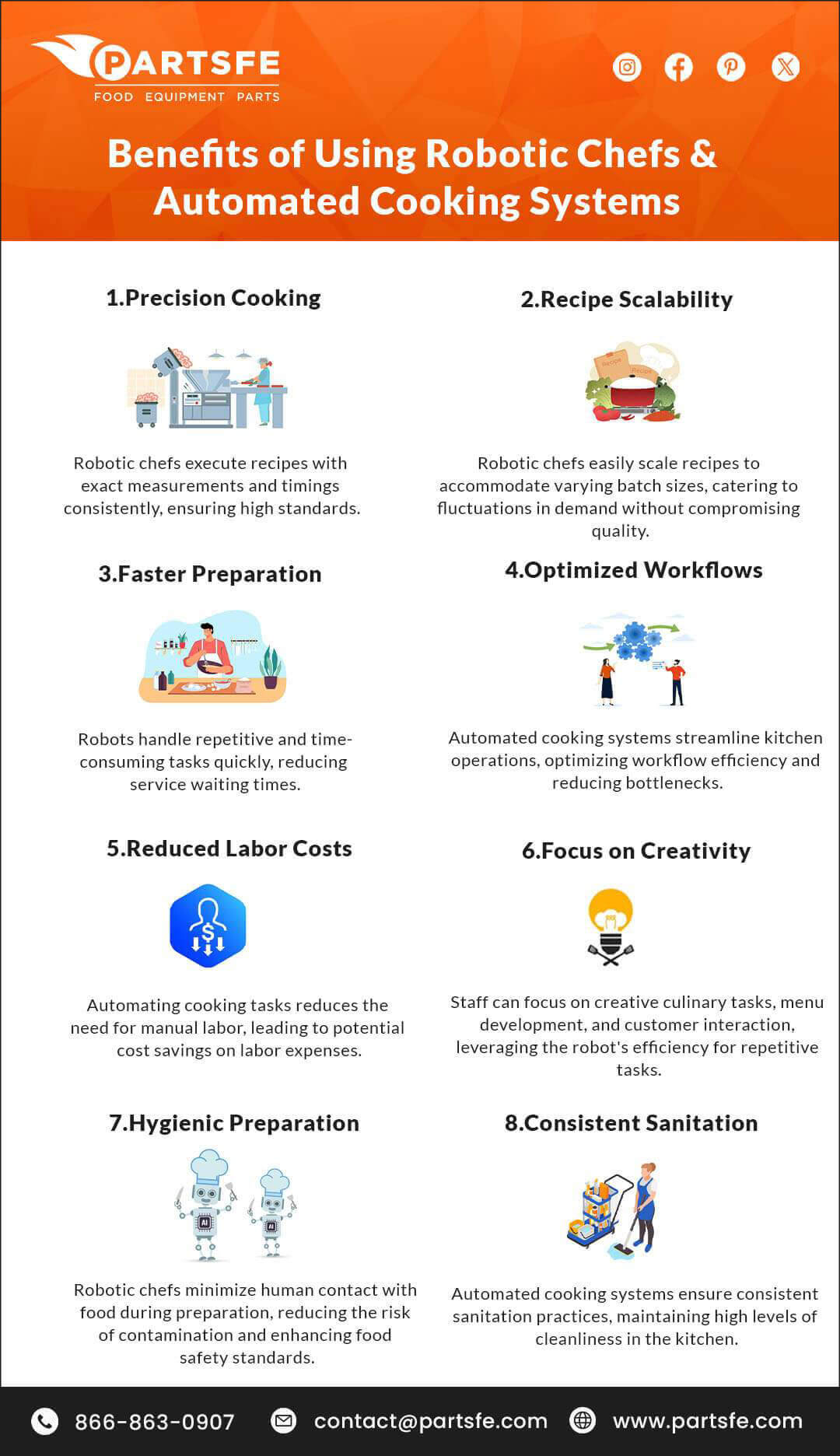
Refer: What Is The Future Of Food Industry? How Is It Evolving?
How is AI transforming order processing and delivery in the food industry?
AI facilitates efficient order-taking and processing by automating tasks such as order entry, payment processing, and order routing. Advanced AI algorithms can analyze historical data to predict order volumes, optimize kitchen workflows, and minimize wait times, enhancing overall operational efficiency. Moreover, AI-powered chatbots and virtual assistants can handle customer orders, providing personalized recommendations and seamless order management.
Impact of AI on delivery logistics and efficiency
Robotics in food industry optimizes delivery logistics, route planning, and real-time order tracking. By leveraging AI restaurants and delivery services can predict demand patterns, optimize delivery routes to minimize transit time, and adapt to changing traffic conditions in real time. This results in improved delivery speed, reduced operational costs, and enhanced customer satisfaction through timely and efficient order fulfillment.
Role of drones and autonomous vehicles in food delivery
The integration of drones and autonomous vehicles in food delivery is a disruptive innovation driven by AI and robotics. Drones and autonomous vehicles equipped with AI-powered navigation systems are revolutionizing last-mile delivery, particularly in urban areas. These technologies offer the potential for faster, cost-effective, and environmentally friendly delivery solutions. By leveraging AI for route optimization, obstacle detection, and precise navigation, drones and autonomous vehicles are poised to transform the food delivery landscape, offering unprecedented efficiency and speed in order fulfillment. The seamless integration of AI in order processing, logistics optimization, and the introduction of next-generation delivery vehicles such as drones and autonomous vehicles is reshaping the food delivery ecosystem, leading to unprecedented efficiency, speed, and customer satisfaction. As AI and robotics continue to advance, they are set to redefine the future of order fulfillment and delivery in the food service industry.
Improving Food Safety and Quality Control
AI plays a crucial role in monitoring food safety and hygiene standards by leveraging data analytics and sensor technologies. AI and food applications can analyze various data points such as temperature, humidity, storage conditions, and expiration dates to ensure compliance with food safety regulations. By detecting anomalies and potential risks in real-time, AI helps prevent contamination, spoilage, and other food safety issues, ultimately safeguarding consumer health and upholding technology and food industry. AI sensors integrated into food processing automation and storage facilities enable real-time quality control by continuously monitoring critical parameters such as pH levels, moisture content, and microbial activity. Through predictive analytics and machine learning algorithms, AI can identify deviations from established quality benchmarks, trigger alerts for corrective action, and optimize the production of fast food automation processes to maintain consistent quality standards. This proactive approach to quality control ensures that only safe and high-quality products are available to customers.
Targeted Marketing Campaigns Using AI Insights
AI-driven insights enable the creation of targeted marketing campaigns by analyzing customer data, purchase behaviors, and preferences. AI algorithms can segment customers based on their demographic information, online interactions, and purchase history to personalize marketing messages, optimize ad spend, and maximize campaign effectiveness. This leads to higher engagement, conversion rates, and improved return on investment for marketing initiatives.
Social media management and reputation monitoring with AI by analysing user interactions, sentiment analysis, and trends to optimize content strategies and engagement. Additionally, AI-powered reputation monitoring tools track brand mentions, customer feedback, and reviews across various platforms. By leveraging AI, businesses can promptly address customer concerns, capitalize on positive feedback, and maintain a positive brand image, ultimately enhancing customer trust and loyalty.
What are some AI solutions for minimizing food waste?
AI offers innovative solutions to minimize food waste by predicting demand, optimizing inventory levels, and reducing overproduction. By analyzing historical sales data, weather patterns, and customer behavior, AI food generator algorithms can forecast demand more accurately, allowing businesses to adjust production and inventory accordingly. Additionally, AI-powered tools can identify perishable items at risk of spoilage, enabling proactive measures to redirect or repurpose excess AI generated food, thereby mitigating waste throughout the supply chain.
AI facilitates sustainable sourcing by analyzing supplier data, certifications, and ethical practices to ensure responsible procurement. Furthermore, AI-powered inventory management systems help optimize stock levels, reduce overstocking, and minimize obsolete inventory, leading to reduced waste and improved sustainability. By integrating AI into sourcing and inventory management processes, businesses can uphold environmental and ethical standards while optimizing resource utilization.
- Optimized transportation: AI algorithms can optimize transportation routes, reduce fuel consumption, and minimize carbon emissions by efficiently coordinating deliveries and reducing vehicle idle time, contributing to sustainable logistics practices.
- Energy efficiency: AI sensors and smart building management systems can optimize energy consumption in commercial electrical & hardware parts, restaurants, and food processing facilities, reducing environmental impact and operational costs while promoting sustainable practices.
- Smart packaging solutions: Packaging AI supports the development of smart packaging solutions that extend shelf life, reduce packaging waste, and enhance product preservation, aligning with eco-friendly packaging practices and sustainability goals.
Predictions for AI advancements in the food service industry
|
Prediction |
Description |
|
Personalized Nutrition |
AI-powered systems will offer personalized nutritional recommendations and meal plans tailored to individual dietary requirements, health goals, and genetic profiles, catering to a more holistic approach to nutrition and wellness. |
|
Robotic Culinary Creations |
Advanced robotic chefs, powered by AI, will be capable of creating complex and customized dishes, combining diverse cooking techniques and adaptable recipes to deliver truly unique culinary experiences. |
|
Hyper-realistic Food Simulation |
AI will facilitate the creation of hyper-realistic virtual food simulations, allowing customers to visualize and interact with their meal choices before ordering, enhancing the dining decision-making process. |
|
Sustainable Sourcing and Production |
AI algorithms will optimize ingredient sourcing, production processes, and supply chain logistics to maximize sustainability, reduce food waste, and minimize environmental impact across the food service industry. |
|
Autonomous Food Delivery |
AI-driven autonomous vehicles and drones will revolutionize food delivery, offering efficient, environmentally friendly, and cost-effective delivery solutions, transforming the last-mile delivery landscape. |
|
AI-Infused Kitchen Operations |
Smart kitchen appliances and equipment powered by AI will automate and streamline food preparation processes, ensuring consistent quality, reducing labor demands, and optimizing kitchen workflows. |
|
Enhanced Customer Engagement |
AI-powered chatbots and virtual assistants will deliver highly personalized and responsive customer interactions, offering tailored menu suggestions, real-time ordering assistance, and proactive customer service. |
|
Predictive Maintenance and Quality Control |
AI will predict equipment maintenance needs, optimize kitchen operations, and ensure food safety and quality through real-time monitoring and predictive analytics. |
|
Culinary Creativity Amplification |
AI will aid chefs and culinary professionals by generating novel recipe ideas, flavor combinations, and menu innovations, expanding the boundaries of culinary creativity and gastronomic experiences. |
|
Seamless Multi-sensory Experiences |
AI will facilitate the creation of immersive multi-sensory dining experiences, integrating elements such as aroma, sound, and visuals to complement and elevate the flavor and presentation of food. |
Know more about: The Future Of Restaurant Equipment: Emerging Trends To Watch
The future of food service is being reshaped by rapid advancements in AI, promising a transformative landscape for restaurants and culinary experiences in 2024 and beyond. From personalized nutrition to robotic culinary creations, sustainable practices, and enhanced customer engagement, AI is set to revolutionize every aspect of the food service industry.
AI will not only optimize operational efficiency and delivery logistics but also elevate the art of gastronomy, driving innovation, sustainability, and personalized experiences.
FAQs
What is the role of AI in restaurants?
AI automates processes, enhances efficiency, and improves the customer experience in restaurants.
What are the benefits of AI feeding in the growing demand in restaurants?
AI enhances operational efficiency, improves the customer experience, and reduces costs while meeting growing demand.
How does an AI food recipe generator work?
AI food recipe generators use algorithms to analyze food trends, dietary preferences, and ingredient combinations to create unique and innovative recipes, speeding up menu development for restaurants


